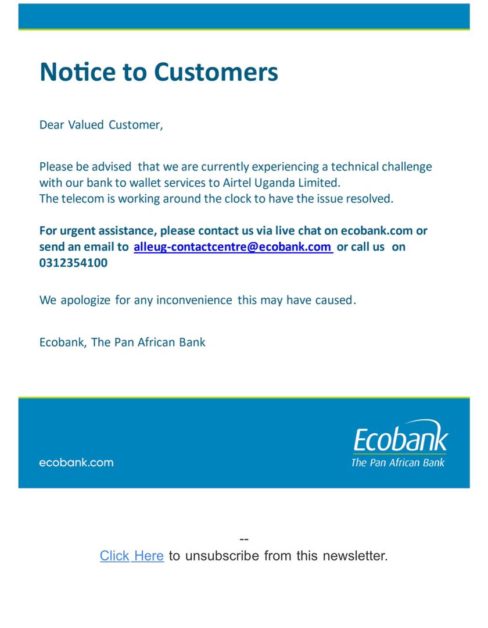Unknown hackers, on Friday, 28th October struck Airtel Mobile Commerce Uganda Limited (AMCUL) systems making off with unspecified amount of money, said to be in billions, CEO East Africa Magazine can exclusively reveal.
AMCUL, a subsidiary of Airtel Uganda, trades as Airtel Money.
According to our sources, the hackers gained unauthorized access to the Airtel Money central systems and wired money to bank accounts in various banks connected to the Airtel to Bank Wallet services. The money was then evacuated via several banking agents across the country as well as mobile money agents.
However, according to our sources, a sudden spike in transactions on the accounts that were previously dormant, alerted the banks and Airtel who immediately shut down the Airtel to Bank Wallet services immediately and immediately started investigations.
David Birungi, the Airtel Uganda Public Relations Manager, Airtel Uganda, confirmed the shutdown in services but did not deny nor confirm the fraud.
“There were technical challenges with our Bank to Wallet and Bulk payments system yesterday. We suspended the services, affecting some customers and partners, to allow the technical teams time to resolve the challenges,” he wrote to this reporter, this evening.
“We are restoring services in a phased manner. By end of day (Saturday) ALL will be up and running,” he said.
Asked if the said “technical challenges” were fraudulent in nature, Mr. Birungi, simply said, “It’s too early to know if there was fraudulent intent.”

Banks like Absa Bank Uganda and Stanbic Bank sent notices to their customers on Friday evening regarding the suspension of the services. However, most of the affected banks have since restored the service.
Gaps within National Identification Registration Authority blamed for continued fraud
However, according to our sources who are very knowledge about the latest digital fraud hit say, the fraudsters, had earlier, using fake identity documents, opened bank accounts as well as acquired SIM-cards that were used to evacuate the stolen money.
It is believed that the fraudsters have gotten a way to fake seemingly legitimate National Identification documents that are used in opening bank accounts and acquiring mobile money SIM cards that are used in the rampart frauds. The ability to withdraw money at several mobile banking and banking agents outlets, many of which do not have CCTVs as opposed to the banking halls and ATMs, makes it even easier for the fraudsters to disappear with their heist.
Mid this year, UGAFODE Microfinance Limited, one of five licensed micro deposit-taking financial institutions (MDI) in Uganda, was hit by digital fraudsters, making off with an amount said to be about UGX400 million before, the bank moved in and shut down the suspicious accounts used to carry out the fraud.
An insider at the bank who spoke to CEO East Africa Magazine, on condition of anonymity said the fraudsters, strongly believed to be either insiders or working with insiders, used ‘doctored’ Know-Your-Customer (KYC) documents to open seemingly legitimate bank accounts, which were then credited from the inside and money was then withdrawn via mobile money accounts and banking agents. The mobile money accounts in question also belonged to untraceable persons.
A sudden spike in activity on the previously dormant accounts, raised suspicion by the bank, who then moved in and closed the accounts which were subsequently found to be ‘fake’. But by the time they did so almost UGX400 million was gone.
Several stakeholders have raised questions about the quality of the data held by NIRA, with many others calling for a fresh registration exercise to capture more authentic data and eliminate the gaping holes that continue to abet digital fraud amongst other security concerns.
Recently, Uganda’s Minister of Internal Affairs, Major General Kahinda Otafiire said that NIRA would start a new round of national identity card registration exercise for all Ugandans in June 2023 and would issue new cards, as the current IDs expire in 2024.
He said that the new National ID will contain several new features but will also rely mostly on old bio data. The cards will be issued free of charge, except for those who will be seeking express processing.

 Absa, ENS Africa, A&O Shearman and Nomura Advise Asahi Holdings on USD 2.3bn Acquisition of 65% Stake in EABL
Absa, ENS Africa, A&O Shearman and Nomura Advise Asahi Holdings on USD 2.3bn Acquisition of 65% Stake in EABL


